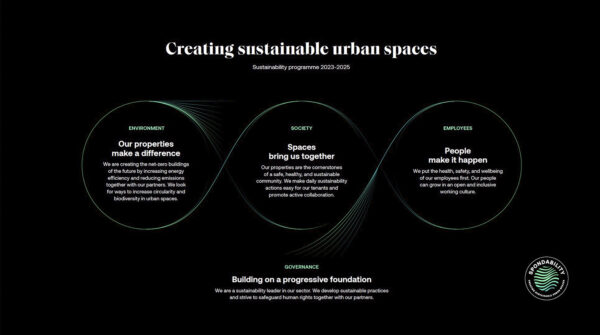Sustainability management

In addition to the company’s strategy, Sponda’s sustainability management practices are based on the Code of Conduct, the UN Global Compact principles and the company’s internal operational guidelines and commitments supplementing them.
The management of Sponda’s sustainability themes is decentralised at the Executive Board level as well as the operational level. Sustainability work and its development are led by the Sustainability Manager, and the President and CEO is responsible for achieving the goals.
Sponda’s Executive Board monitors sustainability matters regularly and, if necessary, they are also processed by the Board of Directors. The progress of the sustainability themes at the group-level is reviewed by the Sustainability Steering Group that meets 4–6 times a year.
We continuously plan and assess our operations from the perspectives of financial, social and environmental responsibility. Our goal is to exceed expectations from the perspectives of our customers, society and the environment, offer the best service and create genuine added value for all of our stakeholders.

Download the full image here »
Read more about Sponda’s sustainability management approach »
Get to know in more detail how we manage sustainability in our sustainability review »
Sustainability commitments
Our Code of Conduct lays the foundation for Sponda’s sustainability efforts and its management. The Code of Conduct covers our sustainability principles, including corporate governance, responsibilities and expectations in terms of key stakeholders, transparent business operations, anti-bribery and anti-corruption practices, environmental responsibility and our responsibility as an employer.
The operations of our stakeholders and partners are guided by our Code of Business Conduct.
In addition, we are committed to complying with the UN Sustainable Development Goals and the 10 principles of the UN’s Global Compact initiative in our operations. These principles cover human rights, labour, the environment and anti-corruption.
Reporting on sustainability
We regularly report our sustainable development operations and the results we have achieved. We apply with the Global Reporting Initiative (GRI) reporting guidelines in our sustainability reporting.
Our annual reporting on sustainability includes the following international and widely recognised sustainability reporting frameworks:
UN Global Compact
The UN Global Compact is a global corporate sustainability initiative aimed at businesses. Participating companies report to the UN annually on their compliance with the Global Compact’s 10 sustainability principles. The report is publicly available here »
GRESB (Global Real Estate Sustainability Benchmark)
GRESB is a global sustainability reporting system for the property sector. It includes reporting on corporate sustainability management systems and principles as well as their implementation and the results achieved.
Science-based climate targets
We have set science-based climate targets and in early 2022 they were validated by the Science Based Targets initiative (SBTi), a global movement driving climate action in the private sector. Joining the initiative demonstrates our commitment to science-based reductions of greenhouse gas emissions in line with the Paris Agreement 1.5 decrees target. Our aim is to reduce emissions from energy consumption in existing buildings and to minimise emissions throughout the value chain.
In addition, we are a member of the Climate Partner Network of the City of Helsinki. We report the results of our climate commitment to the co-operation network annually.
Risks and opportunities
We aim to ensure the continuity of our business operations with efficient risk management. We assess risks in terms of their probability as well as their financial impact. Our key risks are classified as strategic risks, operational risks, damage and asset risks and financing risks.
We aim to ensure the continuity of our business operations with efficient risk management. We assess risks in terms of their probability as well as their financial impact. Our key risks are classified as strategic risks, operational risks, damage and asset risks and financing risks.
Examples of climate change-related risks to our operations include increased extreme weather phenomena and a rise in the sea level.
Green Offices
Our head office in central Helsinki is part of the WWF Green Office programme. As part of the programme, the property has focused on areas including energy savings, waste sorting, environmentally friendly procurement and environmental awareness among personnel.
In addition to the environmental aspects of office work, we have invested in environmentally friendly commuting in the form of company bicycles and low-emission company cars.
